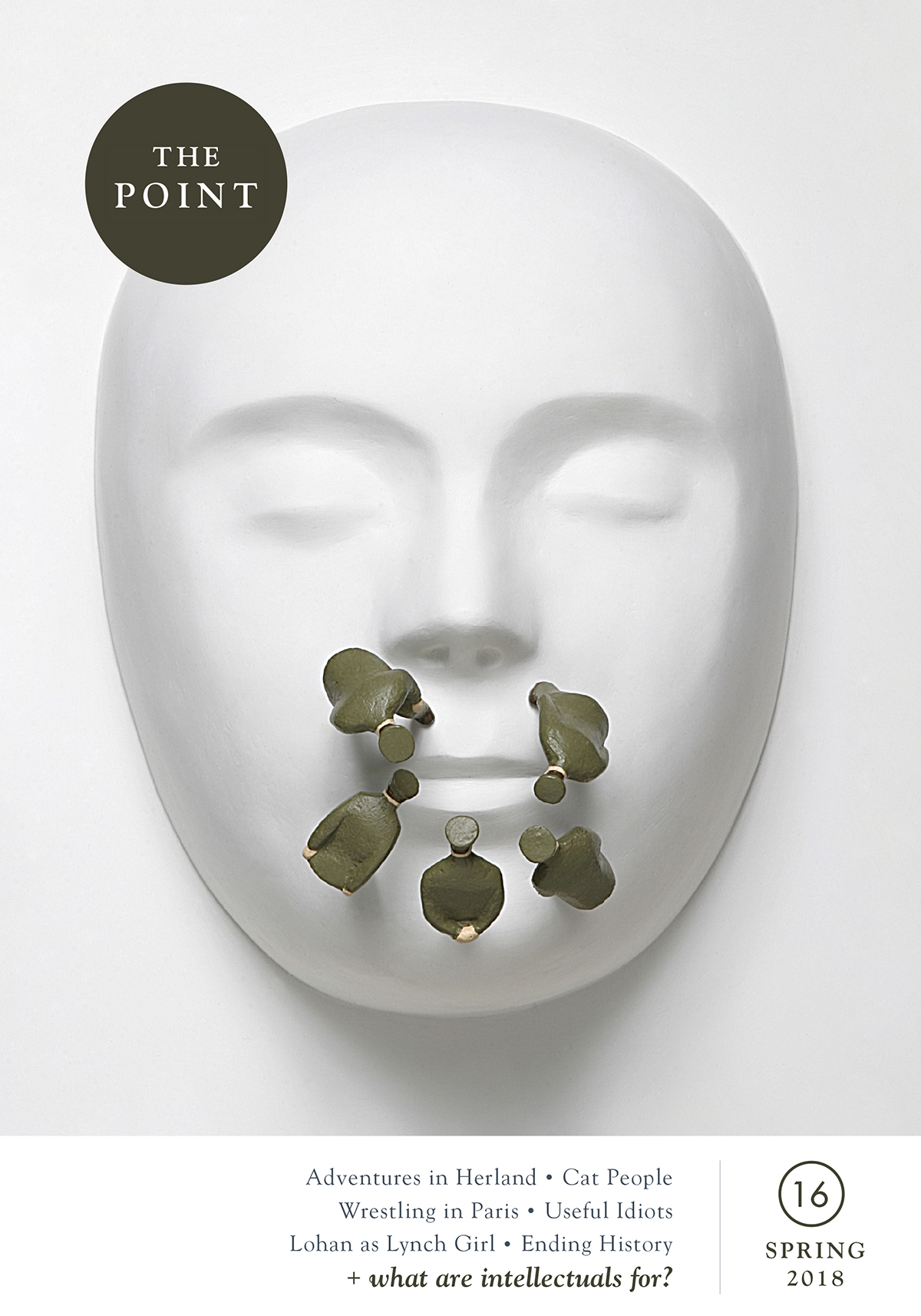The Point 16: What are intellectuals for?
by
multiple authors
(editors)
The Point 16: What are intellectuals for?
by
multiple authors
(editors)
Probably any leftist magazine’s dynamism depends on its ability to balance its elitism with its anti-elitism: a tension that also expresses itself in the eternal conflict between the intellectual’s desire to interpret their society and their desire to play a part in improving it. The balance is liable to be upset by events: ironically, precisely the kind of events that the intellectual has been called a useless idealist for predicting. In 2011, inspired by the activists having finally turned up at the right place (not to mention this place being a short subway ride from their offices), the staffs of n+1 and the New Inquiry, along with assorted other magazine editors and the leftist academics they dated and debated, all wrote about Occupy Wall Street as if they had at long last arrived at the reignition point of history. The early reports from Zuccotti Park were exuberant and hilarious—drum circles to see who would do the laundry!—and suffused with an antiquated academic vocabulary that the writers wielded like rusty axes. The Occupiers were not just occupying space; they were democratizing, communizing and decolonizing it. They had determined that “the process is the message.” They were committed to horizontality and praxis. Never mind the calls for higher taxes on Wall Street, or the forgiveness of student debt; this was a time to “attack dominant forms of subjectivity.” It was the moment to inscribe and to re-inscribe.
In a 2012 review of several collections of writing on Occupy, subtitled “how theory met practice … and drove it absolutely crazy,” Thomas Frank blamed the academics and little magazine writers for failing to convert the energy in the streets into political power as the Tea Party had done on the right. Four years later, when the democratic socialist Bernie Sanders became a credible candidate for the American presidency, Frank’s judgment appeared premature. Perhaps the theory had ultimately aided practice; at the very least, it does not look as if it suffocated it. But Frank’s article, itself published in the Baffler, the little magazine Frank had helped to found, did reveal something about what had by then become the dominant criterion for judging this form of intellectual activity. In one of their Intellectual Situations from 2013, the n+1 editors reported that they were often being asked a question: “If you want to change and not just interpret the world, why not give up writing and become an organizer or activist?” The defensiveness of their answers (we’re too old to become good activists, they complained, then quoted Adorno) showed how far the scales had tipped. The little magazines, contending to become the vanguard of the energies behind Occupy, increasingly demanded that the interpreter be hauled before the tribunal of the activist. Those twenty-somethings I had seen in the gymnasium, who had taught me how to “have” a politics; they had no time for parties anymore. They were busy organizing marches and movements.
They were also reading a new magazine. Jacobin had been started just prior to Occupy, in 2010, its name evoking the most radical and brutal leftist political club during the French Revolution. To its credit, it did not describe itself as a journal of ideas, which would have been false advertising. It was, quite self-consciously, a journal of ideology, whose editor, Bhaskar Sunkara, gleefully promised to put all of his considerable energy into hastening the arrival of democratic socialism. Initially, at least, the magazine did not throw many parties, though it did host a lot of panels, where you could hear young faculty from top universities speak very authoritatively about the ethics of ride sharing in the age of eco-catastrophe. Having grown by far the fastest of the little magazines, Jacobin can also claim, by virtue of its role as the de facto party paper of the Democratic Socialists, to have achieved the most direct political impact. It has solved the problem of left-intellectual elitism simply by ditching the pretense of there being any other role for the intellectual than to aid the activist. Just as for my colleagues at the Center for American Progress, for Jacobin’s contributors there are questions of strategy, but not of substance: writing just is a form of messaging. Introducing a recent interview with Bernie Sanders, the magazine shows its appreciation for its favorite American politician by applauding his ability to remain “on message for more than half a century.” The moral responsibility is no longer to think; it is to advance, as Sanders has, “like a slow-moving tank rumbling through enemy lines.”
[...]
There have always been intellectuals who have chosen to become such tools, for good reasons as well as bad ones. Intellectuals are also citizens, and it is impossible to say in advance when might be the proper time for them to subjugate their intellectual to their civic responsibilities, or predict when those two responsibilities may become indistinguishable. History does show that intellectuals have often been mistaken about their ability to contribute meaningfully to social and political movements—and then, in the rare cases when they have actually taken power, about their capacity to lead them. But from the perspective of today’s New York intellectuals, the danger of making such a choice is not (whatever Katie Roiphe might think) of our becoming Stalinists, or Maoists, or even Bannonites. We do not have enough power to be any of those things; and anyway, we hate guns. The danger is that, in attempting to discipline our desires to our political convictions, we might allow our ideology to overrun our intellect. When everything is political, everything is threatened by the tendency of the political to reduce thinking to positioning.

